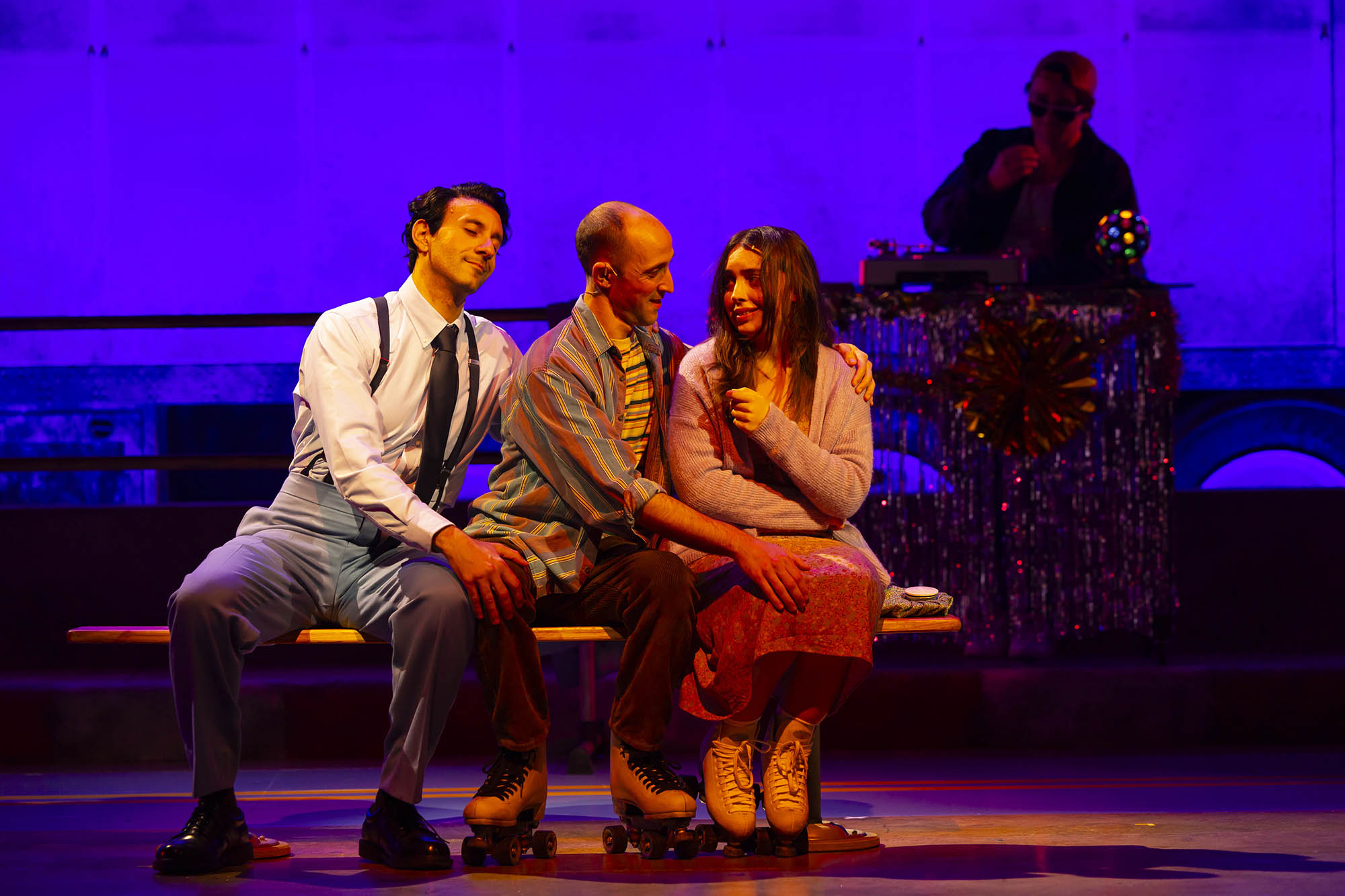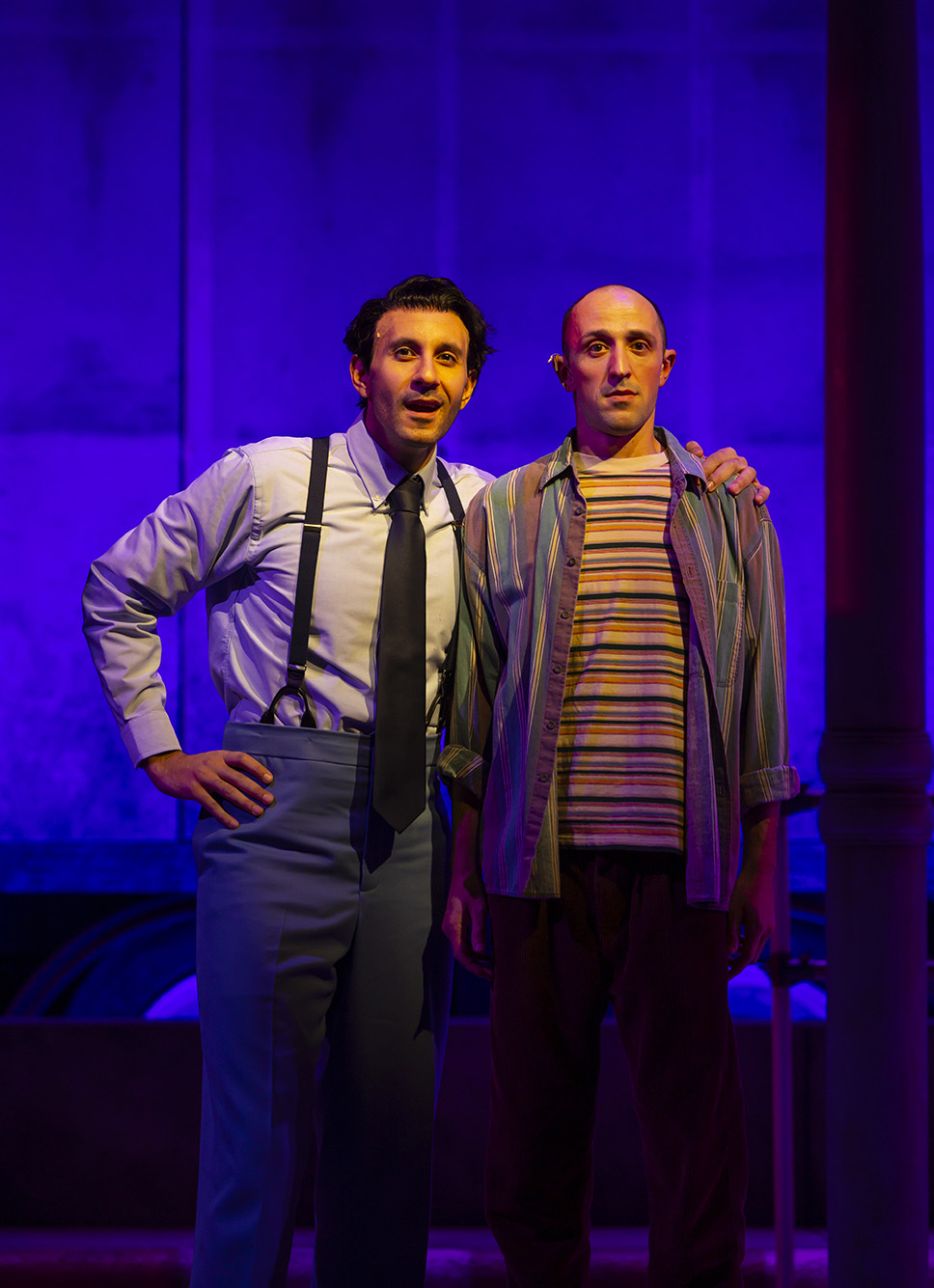Hoping for Human Connection in The Band’s Visit
Jesse Garlick (CFA’14) plays a young Israeli who needs help with his love life in Huntington-Speakeasy collaboration

The Band’s Visit tells the story of Israeli villagers hosting an Egyptian police band stranded by a transportation snafu. Jesse Garlick (CFA’14) (far left) plays the anxious Israeli Papi.
Hoping for Human Connection in The Band’s Visit
Jesse Garlick (CFA’14) plays a young Israeli who needs help with his love life in Huntington-Speakeasy collaboration
It’s a tough time to be hopeful about the Middle East, but the possibility of one-to-one connection across borders is exemplified in The Band’s Visit.
The Tony- and Grammy-winning musical, running at the Huntington Theatre through December 17, is about what happens when an Egyptian police orchestra is stranded in a small Israeli desert town by a transportation snafu, and uneasy conversations with the locals blossom into something more meaningful.
The play is both funny and bittersweet, but the violence in Israel and Gaza, and the emotions it has stirred worldwide, are never far from mind, says Jesse Garlick (CFA’14), who has a key role as the anxious Israeli Papi.
“Being somebody who’s Jewish, somebody whose parents both lived in Israel for long periods of time,” says Garlick, “and my fiancée, her mother was Muslim, so the rise in anti-Semitism and Islamophobia in this country as a result of what’s happening overseas is—I find it very disturbing.”
In the musical, Papi’s hopes to woo his crush, Julia, are blocked by his shyness until he gets a boost from one of the visitors. Julia is played by Emerson grad Josephine Moshiri Elwood, who is Garlick’s fiancée in real life.
“We saw the show when it had its Broadway premiere back in 2018, and I loved it,” Garlick says, of a New York trip with Moshiri Elwood. “An amazing, beautiful moving piece of theater, the kind of theater that I as a theater actor dream of doing.”

A joint production of the Huntington Theatre Company and Speakeasy Stage Company, The Band’s Visit is directed by Paul Daigneault, Speakeasy’s founder and artistic director. “A moving portrait of heartbreak and hope,” the Boston Globe says, and “David Yazbek’s score is a thing of beauty, utterly unimprovable.” The book, by Itamar Moses, is based on the screenplay by Eran Kolirin for the 2007 Israeli film of the same title.
The real-world bloodshed in Israel and Gaza that began on October 7 has added layers of emotion to the production. Garlick credits the creative staff of the two theater companies with support and thoughtfulness, especially around equity, diversity, and inclusion.
“This is a particularly sensitive moment of the Israel-Palestine debate, and we have people with all different viewpoints as members of the cast,” he says. “We’ve been able to work and collaborate with the wonderful people at Speakeasy and the Huntington, who have built us into a really loving ensemble who all really care for each other, but also who all have our viewpoints heard and felt. So it’s been really wonderful to have that collaboration be a part of this experience.”
That perhaps put an extra weight on the first couple of days of rehearsal—“table work,” where the cast and creative team break the play down into its component parts and discuss how to approach it.
“There’s been a little bit of discussion around where our identities are within the context of the play,” Garlick says, “but really, for the most part we’re allowing the piece to speak for itself, and really giving ourselves fully over to the piece and allowing the show to give to audiences what I think many of us were impacted by—its openness, its unpolitical nature.
“It’s really a show about what it means to connect as humans first, before we put on any of the labels of I’m Israeli. I’m Palestinian. I’m Egyptian. I’m Arab. I’m Jewish,” he says.
It’s really a show about what it means to connect as humans first, before we put on any of the labels of I’m Israeli. I’m Palestinian. I’m Egyptian. I’m Arab. I’m Jewish.
The play stars Brian Thomas Abraham as Tewfiq, the band’s conductor, and Jennifer Apple as Dina, Israeli owner of the local cafe. Other BU connections: Andrew Mayer (CFA’11), who plays violinist Camal, Fady Demian (CFA’23) as Zelger, Papi’s friend, and lighting designer Aja M. Jackson, a CFA lecturer.
Some roles are difficult to get into, Garlick says, but Papi came to him easily, in part because the character has “a pretty hefty amount of nervousness” around women, a feeling the actor remembers well from his high school and college years.
The character is supposed to be somewhere between 20 and 28, and at 32, Garlick plays him on the older edge of that range. “I think that also tells maybe a more sad story about somebody who’s 28, and hasn’t, you know, had that experience yet.”
Papi ultimately overcomes his fears aided by his connection to band member Haled (Kareem Elsamadicy), Garlick says, “and is able to have the cathartic experience of overcoming his own anxiety. And to make that connection to my actual fiancée, who’s acting opposite me in the show, it’s been really, really quite a blessing.”

Theater brought the real-life couple together back in 2016. Moshiri Elwood saw Garlick in a dance performance she attended with one of his friends, but they didn’t hit it off until months later, when he saw her in a Speakeasy production of Hand to God and asked her out afterward. They two have been together eight years now, and Garlick proposed last June. The Band’s Visit is the first time they’ve acted together, and it marks the Huntington debut for both of them. They are “over the moon” about it, he says.
Funny story, though.
Garlick was cast before Moshiri Elwood and he had to read with her and several others who were auditioning for the role.
“When they were working out the casting of that part,” he says, “somebody in the room was like, ‘I don’t know. Do you buy them being in a relationship together?’ And Paul was like, ‘Well, you might not know this, but they’re engaged to be married. So I’ll certainly buy it.’ I really appreciate him being in our corner. Because it’s been such a special experience on account of him.”
Confirming the anecdote, Daigneault says, “I purposely try not to bring what I know of people’s personal lives into casting decisions, because, you know, I just try to keep the boundaries. But in this case, I needed to bring that up because in order to support my decision to want them, not because they were a couple, but because they were right for the roles. And Jesse is just so talented and so easy to work with. One of those actors where you don’t have to really direct, you just sort of let him do his thing. And then you edit him.”
Daigneault acknowledges that it was impossible to ignore the current real-world context, but directing a show like The Band’s Visit is not about politics, he says: “My focus is intentionally nonpolitical. It’s really about humanity and connecting. How people find connection, even if they think that they have nothing in common.”
Or as Garlick puts it: “This show, which has been so wonderful at putting us into this really lovely sense of friendship and connection and love for one another, has this endpoint, where it’s also looking out at the audience and saying, ‘Where are we now? Is there still hope?’ And it’s really up to the audience to go out into the world and try and answer these questions of, can there still be connection even in these incredibly dark, tragic, horrific times? Is there still the potential?
“It’s a great piece of art because it’s not supplying us with the answers. It’s just giving us the questions, and it’s up to us as an audience to go out and answer those questions ourselves in our communities.”

Comments & Discussion
Boston University moderates comments to facilitate an informed, substantive, civil conversation. Abusive, profane, self-promotional, misleading, incoherent or off-topic comments will be rejected. Moderators are staffed during regular business hours (EST) and can only accept comments written in English. Statistics or facts must include a citation or a link to the citation.